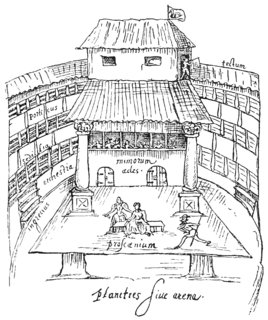Alexander Gough (fl. 1626 – 1655), also Goughe or Goffe, was an English actor in the Caroline era. [1] He started out as a boy player filling female roles; during the period of the English Civil War and the Interregnum (1642–1660) when the theatres were closed and actors out of work, Gough became involved in the publication of plays.
Floruit, abbreviated fl., Latin for "he/she flourished", denotes a date or period during which a person was known to have been alive or active. In English, the word may also be used as a noun indicating the time when someone flourished.

The Caroline or Carolean era refers to the era in English and Scottish history during the Stuart period (1603–1714) that coincided with the reign of Charles I (1625–1642), Carolus being Latin for Charles. The Caroline era followed the Jacobean era, the reign of Charles's father James I & VI (1603–1625); it was followed by the Wars of the three Kingdoms (1642–1651) and the English Interregnum (1651–1660).

Boy player refers to children who performed in Medieval and English Renaissance playing companies. Some boy players worked for the adult companies and performed the female roles as women did not perform on the English stage in this period. Others worked for children's companies in which all roles, not just the female ones, were played by boys.
Alexander Gough was born in 1614, the son of Robert Gough, an actor with the King's Men. Like some other sons of actors (Theophilus Bird; Robert Pallant), Gough started acting as a boy — in his case, with his father's company. Alexander Gough played:
Robert Gough, also Goughe or Goffe, was an English actor who took female parts in Shakespeare's plays. He was the father of actor Alexander Gough.
The King's Men was the acting company to which William Shakespeare (1564–1616) belonged for most of his career. Formerly known as The Lord Chamberlain's Men during the reign of Queen Elizabeth I, they became The King's Men in 1603 when King James I ascended the throne and became the company's patron.
Theophilus Bird, or Bourne, was a seventeenth-century English actor. Bird began his stage career in the Stuart era of English Renaissance theatre, and ended it in the Restoration period; he was one of the relatively few actors who managed to resume their careers after the eighteen-year enforced hiatus (1642–60) when the theatres were closed during the English Civil War and the Interregnum.
- Caenis in Massinger's The Roman Actor , 1626
- Acanthe in Massinger's The Picture , 1629
- Eurinia in Wilson's The Swisser , 1631
- Lillia-Bianca in Fletcher's The Wild Goose Chase , the 1632 revival.

Philip Massinger was an English dramatist. His finely plotted plays, including A New Way to Pay Old Debts, The City Madam and The Roman Actor, are noted for their satire and realism, and their political and social themes.

The Roman Actor is a Caroline era stage play, a tragedy written by Philip Massinger. It was first performed in 1626, and first published in 1629. A number of critics have agreed with its author, and judged it one of Massinger's best plays.
The Picture is a Caroline era stage play, a tragicomedy written by Philip Massinger, and first published in 1630.
Gough also had roles in Ford's The Lover's Melancholy (1628) and Clavell's The Soddered Citizen (1630). Gough remained with the company at least until 1636, and perhaps longer, probably playing minor adult roles.

John Ford was an English playwright and poet of the Jacobean and Caroline eras born in Ilsington in Devon, England.
The Lover's Melancholy is an early Caroline era stage play, a tragicomedy written by John Ford. While the dating of the works in Ford's canon is very uncertain, this play has sometimes been regarded as "Ford's first unaided drama," an anticipation of what would follow through the remainder of his playwriting career. It is certainly the earliest of his works to appear in print.
This article is a summary of the literary events and publications of 1628.
in 1642, at the start of the Civil War, the Puritan regime forced the closure of the London theatres. Theatrical activity did not cease entirely; rather, actors staged clandestine performances, often at the private houses of sympathetic citizens. In so doing, the actors faced a major and obvious problem: how to find audiences for "secret" performances (ideally, audiences that did not contain informers who would betray them to the authorities). During this period, Alexander Gough reportedly functioned as what was then called a "jackal" — he helped to gather audiences for these clandestine performances. [2]
Later in the Commonwealth era, Gough was active in publication, specifically of plays. He was not the only actor who shifted to publishing; Andrew Pennycuicke and William Cartwright did the same. Most notably, Gough wrote an introduction to Humphrey Moseley's 1652 first edition of The Widow ; his preface "To the Reader" re-iterated the title-page attribution of that play to John Fletcher, Ben Jonson, and Thomas Middleton. Modern scholars and critics have strongly rejected the attribution to Fletcher and Jonson, and recognize The Widow as a solo work by Middleton. [3]
Andrew Pennycuicke was a mid-seventeenth-century actor and publisher; he was responsible for publishing a number of plays of English Renaissance drama.

William Cartwright was an English actor of the seventeenth century, whose career spanned the Caroline era to the Restoration. He is sometimes known as William Cartwright, Junior or William Cartwright the younger to distinguish him from his father, another William Cartwright, an actor of the previous generation.
Humphrey Moseley was a prominent London publisher and bookseller in the middle seventeenth century.
Gough was also involved with the first editions of The Queen (1653), a play assigned to John Ford, and Lodowick Carlell's The Passionate Lovers (1655).



